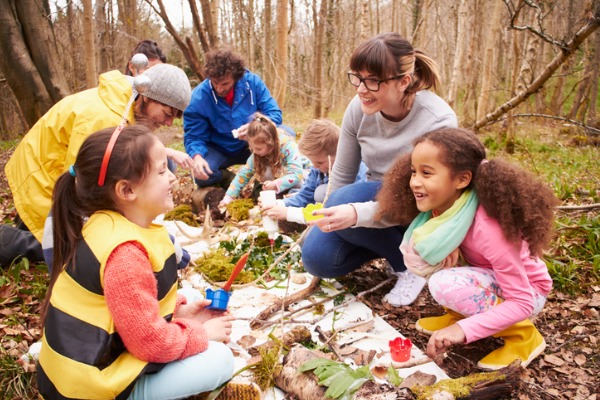What is Forest School? Elizabeth Holmes discusses establishing a Forest School and the benefits that come with it.

What if we knew that spending time outside in the natural world contributed positively to our sense of health and overall wellbeing? Would that impact how we teach children to maximise their learning potential by harnessing that sense of wellbeing?
A growing body of research tells a story of the need for us to take our nature connectedness far more seriously if we are to improve our ability to thrive in the context in which we find ourselves.
Forest school is an experiential educational approach developed in the UK in 1993 and inspired by the Scandinavian approach to education. According to the Forest School Association, it is governed by some key features and principles.
It is a strategy for 2030 that has been informed by ‘young people, sustainability and climate change experts, and sector experts.'
Marina Robb, Director of The Outdoor Teacher and Circle of Life Rediscovery and co-author of The Essential Guide to Forest School and Nature Pedagogy, sees the immense benefits of enabling children to learn outside. She explained, ‘This approach builds agency, autonomy, and motivation. It develops physical skills, emotional awareness, critical thinking, and a deeper relational understanding.’
Taking children outside to learn in nature has value for all involved. As Robb explained, ‘Outdoor learning is embodied and experiential learning. It’s a way of learning that responds to all aspects of growth and teaches us to enjoy parts of our lived experience.
'As an ethos, Forest School celebrates the connection to self, others and the natural world and gives us time to integrate and follow what we most need from time spent outdoors. It promotes a way of teaching that is respectful of the individual and the relationship and takes care of the adult, not to dominate the agenda, but observe and listen to what is needed.’
If you would like to establish a Forest School for the pupils in your school, Robb suggests some key strategies to try.
She explained, ‘Firstly, they need to have the support of senior management as effective Forest Schools need to be given the time, space, and resources to support children and staff’s wellbeing. I suggest training at least two staff in Forest School level three training. Make sure the school thinks ahead to provide at least two hours per week at Forest School for half a class.’
Taking children outside to learn in nature has value for all involved.
The government published a sustainability and climate change strategy for the education and children’s services systems on 21 April 2022. It brings together short, medium, and longer-term actions designed to ‘enable us to progress towards achieving our four strategic aims and overarching vision.’ It is a strategy for 2030 that has been informed by ‘young people, sustainability and climate change experts, and sector experts.’
With aims of excellence in education and skills for a changing world, net zero, resilient to climate change, and a better environment for future generations, there are five key action areas in the sustainability policy paper:
The next steps towards this vision of the UK as a world-leading education sector in sustainability and climate change, as detailed in the policy paper, are:
One way of harnessing the myriad benefits of learning outside is via the Outdoor Learning Award. This offers a framework of eight benchmarks of practical strategies for taking learning outdoors.
Schools can work towards these benchmarks to help ensure that learning takes place outside, regularly, across the curriculum. It also allows schools to engage parents and staff in outdoor education and will help ensure that staff get the skills they need to use outdoor learning effectively.
In some schools, this may require a wholescale culture change, while for others, already on the pathway to improving their outdoor learning, this could be a nudge in the right direction.
There are eight benchmarks of best practice that make up the Outdoor Learning Award framework.
The environmental awareness that can come from high-quality outdoor education, such as a well-run Forest School programme, can effectively feed children’s wellbeing, and understanding of the climate emergency and the need for schools to act.
Being in the natural world, understanding nature in the spaces where you live and work, and developing a notion of stewardship are vital parts of our education and development. And now, there are clear steps we can take to enhance our offer.

Promote positive attitudes around outdoor learning and ensure pupils are involved and engaged.
See what the benefits and impact on undertaking the Outdoor Learning Award would have on your school.